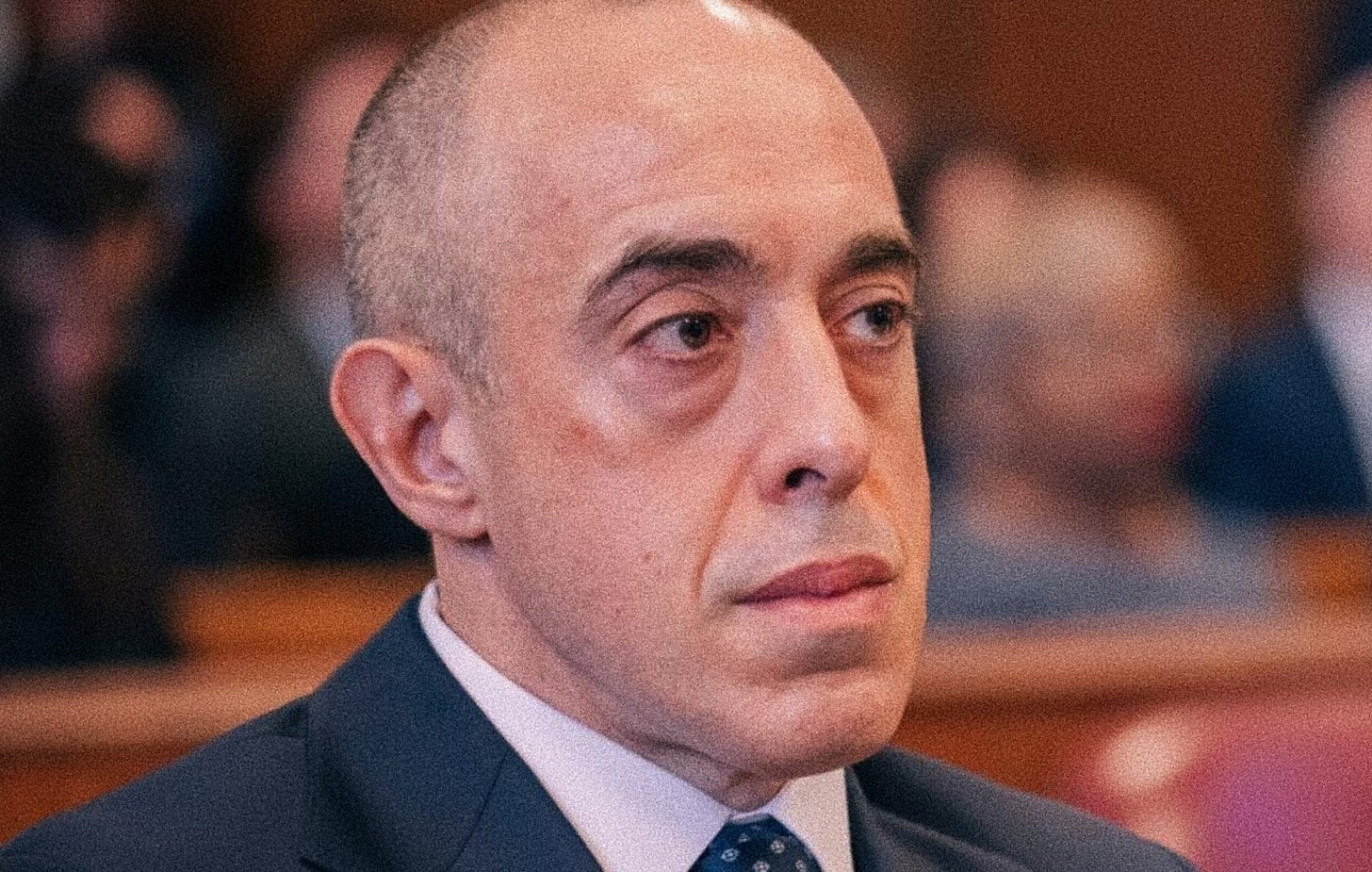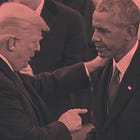The Confirmation of Trump Loyalist Emil Bove to a Powerful Court Shows that Senate Republicans Don’t Care if Anarchy Replaces the Rule of Law in America
It is a deeply cynical move that would have shocked and appalled the Founders

Every U.S. senator takes a solemn oath to support, defend, and bear true faith and allegiance to the Constitution of the United States. That means honestly performing the Senate’s core constitutional functions, one of which is determining the fitness of nominees for high government office.
But in a stunning abdication, Senate Republicans voted last week to confirm Emil Bove III to a lifetime appointment on the U.S. Court of Appeals for the Third Circuit. Bove, Trump’s personal lawyer who was part of his defense team, was already serving as the Principal Associate Deputy Attorney General at the Department of Justice, a top position that is essentially the right hand to the Deputy Attorney General, the #2 post at the DOJ and particularly responsible for criminal law and national security functions. In his role, he distinguished himself not by service to the rule of law but enthusiasm for satisfying the corrupt whims of this president.
He:
emphatically told prosecutors to be prepared to defy or evade court orders, such as the ones that would bar the administration from illegally deporting undocumented immigrants without due process;
dismissed a corruption case against a sitting mayor not for sound legal reasons but for political leverage;
targeted prosecutors under his command who refused to go along with his unethical instructions to drop cases for political reasons;
fired federal prosecutors and oversaw purges of other officials who simply did their duty investigating crimes that happened to embarrass the president.
Yet only two Senate Republicans, Susan Collins of Maine and Lisa Murkowski of Alaska, joined their Democratic colleagues in rejecting Bove’s appointment, which now puts him within striking distance of the Supreme Court.
This is not a one-off for this august body; for the past eight months, Republicans have used their dominance in it to affirm distinctly unfit Trump nominees. Still, Bove’s confirmation marks the crossing of a Rubicon in our continuing slouch toward presidential Caesarism.
The Founders’ Fitness Test
The Senate’s power of advice and consent over nominations has frustrated presidents since the Founding, but that is precisely the point.
The Revolutionary generation, an ocean away from the Crown, experienced British misrule most directly through the power of royal agents. The Founders knew well that administrators and judges selected for their expected fealty to the ruler, rather than excellence and commitment to law, posed grave threats to liberty and good government. In the Declaration of Independence, a prominent grievance against the king is that he “made Judges dependent on his Will alone, for the tenure of their offices, and the amount and payment of their salaries,” and sent “swarms of Officers to harass our people.”
Hence the Founders devised a system in which presidents got to appoint executive branch officers who advanced their agenda, but only after the Senate provided its advice and consent to his choices. The Senate was meant to compel the president to choose appointees who have the character and fitness to perform their roles, chief among which is placing the Constitution and the rule of law above personal loyalty. Judicial appointments—granted lifetime tenure and assigned to an equal branch of government—must meet an even higher standard.
Alexander Hamilton, writing in the Federalist Papers, explained the logic of requiring Senate consent over presidential appointments:
[A] man who had himself the sole disposition of offices, would be governed much more by his private inclinations and interests, than when he was bound to submit the propriety of his choice to the discussion and determination of a different and independent body, and that body an entire branch of the legislature.
Hamilton assumed a sense of honor in the president and civic virtue in the voting public, such that Senate review of appointees “would have a powerful, though, in general, a silent operation.” That is, a president would more often refrain from nominating unfit characters or servile loyalists for fear not only of Senate rejection but of public ignominy. Hamilton wrote that the president:
would be both ashamed and afraid to bring forward, for the most distinguished or lucrative stations, candidates who had no other merit than … being in some way or other personally allied to him, or of possessing the necessary insignificance and pliancy to render them the obsequious instruments of his pleasure.
In an America that cherished its liberties, Hamilton believed that a president who promoted loyalists to key positions would face extreme danger to “his own reputation” and “to his political existence.”
Loyalty to Trump is the Sole Job Qualification
An excess capacity for shame is not among President Trump’s weaknesses. Nor does he fear losing support by violating republican norms—as he once said, his voters would forgive him for murder in broad daylight. Seemingly regretting that he staffed his first administration with largely honorable figures who checked his worst instincts, Trump has taken a different course in his second term, issuing a barrage of nominations and appointments of outrageously ill-suited figures to positions high and low.
Pete Hegseth, Tulsi Gabbard, Robert F. Kennedy Jr., and Kash Patel, among others, have demonstrated manifest unfitness for office. In a tacit acknowledgment of his own poor judgment, Trump mused about evading standard background checks and even recessing Congress to allow mass appointments without Senate review. In the end, he needn’t have worried—after a few murmurs of concern, the cowed Republican Senators confirmed the lot of them.
The effort to stack the administration with Trump loyalists who owe their stature entirely to his favor—in Hamilton’s words, “obsequious instruments of his pleasure”—hasn’t been confined to senior leadership. Lower-level appointees have been required to make untruthful or immoral statements as part of standard vetting. Currently serving officials have lost their jobs for carrying out their duties honorably, for example admitting that the government had erred in deporting Abrego Gargia to the Salvadoran Gulag without due process.
But the rapid corruption of the government into a racket is most apparent—and most dangerous—at the Justice Department.
Although all executive branch employees are sworn to uphold the Constitution, obedience to the law defines the DOJ’s mission. The department plays a critical role in protecting civil rights and liberties, advising the rest of the government on legal constraints, and shaping the government’s approach to litigation. It also holds immense prosecutorial power to investigate and seek imprisonment, or even death, for accused criminals. In the hands of partisans, conspiracists, and presidential sycophants, the DOJ can do untold damage. That damage is far more likely when the president wildly and irresponsibly accuses his critics of crimes, including capital crimes like treason.
Trump has turned over the Justice Department to precisely the wrong types of figures—those who owe their position based on loyalty to him rather than any serious commitment to the rule of law. Conspiracists and propagandists now run the FBI. The top positions at Main Justice have gone to the president’s former personal attorneys. Powerful U.S. Attorney posts have been filled not by respected conservative prosecutors but by MAGA figures and provocateurs. Ed Martin, who led Trump’s Stop the Steal campaign and openly bragged that he would put the office in the service of the president’s agenda and against its enemies (including the Associated Press), was his initial pick to lead the U.S. Attorney’s Office for D.C. Now serving as Pardon Attorney, he has vowed to “leave no MAGA behind.” To help him run a task force dedicated to carrying out Trump’s retribution agenda, Martin hired as an adviser a former FBI agent who allegedly implored Jan. 6 rioters to kill police officers.
Remaking the Judiciary in Trump’s Image
Already, we see alarming signs that cases and investigations are being dropped—or launched—based on the political interests and personal grievances of the president. The corrupt mishandling of the federal prosecution of New York City Mayor Eric Adams by Emil Bove marked the beginning of this turn. Bove reportedly pressured prosecutors to drop the public corruption case in exchange for Adams’ cooperation with the president’s deportation agenda. He did this, in his own words, “without assessing the strength of the evidence or the legal theories on which the case is based.” Bove’s actions led to a wave of resignations, including from some of the country’s most respected conservative lawyers, who refused to carry out unethical directives. It is a painful sign of the times: those who followed the law were forced out, while those who corrupted it were rewarded.
In nominating Bove to the bench, President Trump signaled his intent to remake—and fatally compromise—the judiciary just as he has done with the Justice Department. His message was unambiguous. Announcing the nomination to his followers on his social media platform, Trump promised that Bove would “do anything else that is necessary to MAKE AMERICA GREAT AGAIN. Emil Bove will never let you down!” The declaration came the same week that Trump announced his break from the traditional conservative legal movement, angered by its failure to back his power grabs.
On the day of the nomination, the Senate, including conservatives, had ample reason to reject Bove. Multiple whistleblower reports concerning his disregard for the law and contempt for the courts emerged in the weeks that followed—alleging, among other things, that he told federal prosecutors that they should be prepared to tell courts “f*ck you” and ignore their orders that interfered with the president’s agenda. The Justice Department's bizarre and concerning handling of the Jeffrey Epstein case only raised further questions.
Bove’s testimony before the Judiciary Committee offered little comfort to critics or reason for support. He repeatedly refused to answer questions about his involvement in a variety of Justice Department scandals based on flimsy claims of privilege and retreated behind unconvincing, highly lawyered denials and claims to “not recall.” In response to a softball invitation from one Republican senator to explain his respect for the courts and the rule of law, Bove astonishingly cited his decision to represent Donald J. Trump—the world’s highest profile defendant and a billionaire paying client. He described that choice as a demonstration of his courage to fight for “what is right.” It was, he said, the “one moment in my life where I was really called upon” to exercise judgment in the face of criticism.
This is Bove’s self-understanding of his profile in courage. He did not mention defending the weak against the powerful. He did not cite a time he sided with a political opponent because the law demanded it. He didn’t even demonstrate his conservative credentials by citing occasions in which he risked condemnation from his Manhattan friends for standing against Roe vs. Wade or criticizing Obergefell on originalist principles. He wanted the Senate to respect his “bravery” in taking a career-making job defending a corrupt politician for pay.
The Conservative Legal Movement Abandons All Convictions
Republican senators mounted no meaningful defense of Bove. Instead, they dismissed objections as last-minute smear campaigns designed to derail the confirmation. But the whistleblower claims against Bove echoed longstanding concerns about his professional judgment, character, and temperament—concerns that predate his service in the Trump administration. These were not half-remembered, decades-old stories; they were specific and credible allegations giving added depth to existing concerns about Bove, filling out details about his involvement in controversies over the last few months.
Yes, Democrats reflexively oppose too many Republican nominees. It is a bipartisan scandal that confirmation votes have become little more than partisan exercises. But that fact cannot justify blind support for increasingly extreme nominees—or for a president who is now extending his politicization of justice to the judiciary itself. Bove, who shows no commitment to any recognizable theory of conservative jurisprudence, offers no benefit even to the conservative legal movement.
The movement’s failure to oppose this nomination—despite Trump’s explicit break with its values—suggests there will be little principled resistance to further efforts to degrade the courts. Conservatives once opposed a president of their own party on principle over judicial nominations. Then they backed Trump in exchange for principled judges. Now, it appears, they will support Trump nominations simply because he made them. No doubt the White House has learned this lesson and will apply it when filling future vacancies, including on the Supreme Court. When the conservative legal movement demonstrates it lacks all conviction, it can count on the passionate intensity of the postliberal right to fill the void.
Even with the near-blank check Senate Republicans have granted Trump on appointments, he is still not satisfied. His administration is increasingly exploiting procedural maneuvers to avoid Senate review for his most extreme executive branch appointments. Last week, Trump called for the Senate to abandon its “blue slip” custom—a tradition with roots dating to the Washington administration, which gives home-state senators leverage over nominations. This has already been abandoned for appellate nominees, allowing someone like Bove, a White House favorite without obvious Senate allies, to ascend despite serious concerns. And Trump’s biggest Senate backers, some self-described constitutionalists, are shamelessly advocating for Congress to recess to allow mass presidential appointments without review.
One might hope that with lifetime tenure secured, Bove would feel free to honor his oath and break with his patron when duty requires. But early signs offer little basis for such hope. Shortly after his confirmation, Bove celebrated at MAGA’s favorite bar, at an event hosted by a group that regularly attacks judges who rule against Trump and cheers the transformation of the DOJ into a political weapon. There, he mingled with the likes of Steve Bannon, Martin, and others who see law not as a constraint on government but as a tool with which to crush the left.
Shortly after the event honoring Bove, his chief host—who has so fulsomely celebrated Bove’s confirmation as a restoration of the rule of law and lauded him a model of Trump nominees going forward—took to X to call for the imprisonment of Barack Obama and Hillary Clinton.
This is not law. It is a betrayal of the republican spirit. It is anarchy loosed upon the world.
© The UnPopulist, 2025
Follow us on Bluesky, Threads, YouTube, TikTok, Facebook, Instagram, and X.
We welcome your reactions and replies. Please adhere to our comments policy.







What's replacing the rule of law is anything but anarchy. Autocracy is what's coming, and the Republicans in the Senate are fine with it, they proved over and over again for ten years -- and more, let's be honest -- because the profit well. The unitary executive did not originate with Trump, nor did the idea that if the president does it, it's not illegal. However, they both have a Republican pedigree.
I do believe it is even more cynical than that. If all goes according to plan, Love is slated to replace either Alito or Thomas when they step down